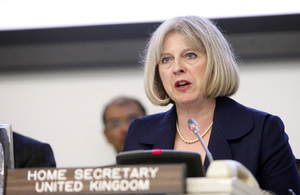Clare’s Law rolled out nationally on International Women’s Day
Clare's Law – a scheme allowing police to disclose details of an abusive partners’ past – will be rolled out across England and Wales from today, International Women's Day.

Theresa May
Clare’s Law – the Domestic Violence Disclosure Scheme – is designed to provide victims with information that may protect them from an abusive situation before it ends in tragedy. The scheme allows the police to disclose information about a partner’s previous history of domestic violence or violent acts.
Today’s national roll-out has been chosen by the Home Secretary to coincide with International Women’s Day.
It follows a 14-month pilot in 4 police force areas, which provided more than 100 people with potentially life-saving information.
From today Domestic Violence Protection Orders (DVPOs) are also being rolled out across England and Wales.This new power will enable police and magistrates’ courts to provide protection to victims in the immediate aftermath of a domestic violence incident.
International Women’s Day
Home Secretary Theresa May said:
Domestic abuse shatters lives and this government is working hard to provide police and local authorities with the tools they need to keep women and girls safe.
Clare’s Law and DVPOs are just 2 of a raft of measures we have introduced to hand control back to the victim by ensuring they can make informed decisions about their relationship and escape if necessary.
Protection for victims is improving but sadly there are still too many cases where vulnerable people are let down.
I am determined to see a society where violence against women and girls is not tolerated, where people speak out, and where no woman or girl has to suffer domestic abuse.
Clare’s Law
The Domestic Violence Disclosure Scheme – often known as Clare’s Law – is named after Clare Wood who was brutally murdered 5 years ago by her former partner George Appleton, who had a record of violence against women.
Domestic violence
DVPOs can be used to provide immediate protection to a victim where there is not enough evidence to charge an alleged perpetrator and provide protection to victims via bail conditions. A DVPO can last for up to 28 days, during which time the perpetrator can be prevented from having contact with the victim.
DVPOs are designed to give victims the time and space they need to make decisions about their options and future safety with the help of a support agency.
Crime Prevention Minister Norman Baker said:
Domestic violence is illegal and this coalition government has made significant progress in tackling abuse in all its forms.
Last year, we extended the definition of domestic violence to include controlling and coercive behaviour and in December re-launched the This is Abuse campaign to highlight to young people that it’s not just physical violence that makes a relationship abusive.
We have also ring-fenced nearly £40 million of funding for specialist local support services and national helplines to help people escape abusive situations.
The implementation of Clare’s Law and DVPOs are among the successful measures introduced to tackle violence against women and girls and form an integral part of the government’s Call to End Violence against Women and Girls’ Action Plan 2014.
The plan includes a commitment to put in place a new code of practice to ensure that safe addresses of victims of domestic and sexual abuse are protected. This will take effect where victims might otherwise have to reveal details of their address to people who could threaten them – for example in court cases unrelated to their abuse, or when required for their children’s school records, or the family’s access to benefits.